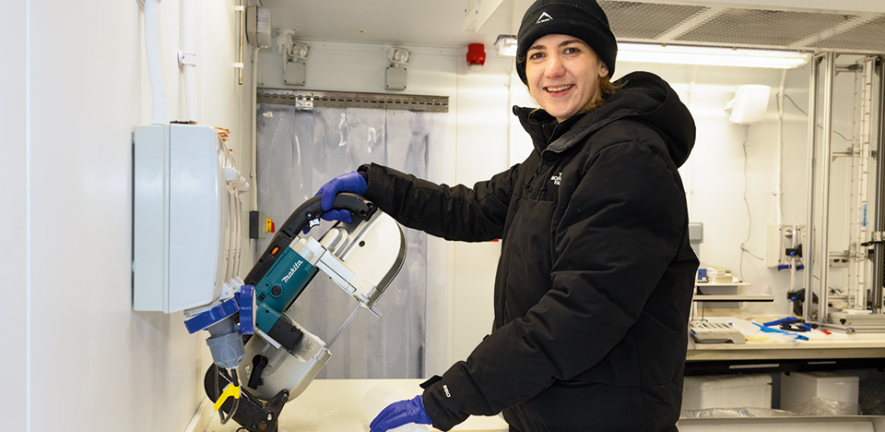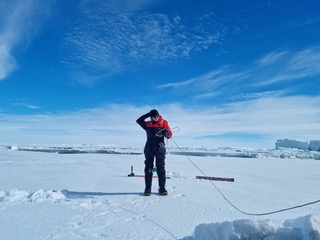
In 2021, Dr Yusuf Hamied (Christ’s 1954) gave a transformational leadership gift to the Department which included support for distinguished scholars at postgraduate level. This fund has been a landmark moment for Siobhan from the Giorio Group and Choy from the Wales Group whose studies have taken them on vastly different journeys in Cambridge and around the globe.
Siobhán Johnson
Giorio Group, Antarctic biochemistry
Magdalene College, 2022

Siobhán Johnson in the Antartic, supplied by Siobhán.
Siobhan researches Antarctic sea ice and how its organic composition varies regionally and seasonally. Sea-ice algae produces fatty acids which are then found in the sea ice and the underlying water. These measurements and observations of the changes of the fatty acid composition can help build a picture of the sea-ice algae community and how it may change with the annual changes of the sea ice. These observations can be used to calibrate paleoclimate models which are essential for global and Antarctic climate projection models.
The PhD involves working between laboratories at the Yusuf Hamied Department of Chemistry and the British Antarctic Survey, as well as visiting the Antarctic to collect sea-ice samples. On top of these amazing networks, Siobhan also enjoys being part of Magdalene College, noting: “It has become a wonderful source of community for me here. I am eternally grateful for receiving this funding, because not only has it allowed me to continue doing something I love and find valuable, but has allowed me to do so in an environment that is supportive and nurturing of my research career.”
Choy Boy
Wales Group, Quantum computing
Girton College, 2023

Choy Boy at his desk, by Michael Webb ©University of Cambridge.
Choy works at the fundamental level studying quantum computing and computational chemistry that can help researchers in the lab further down the line. Quantum computing shows promise for tackling a wide variety of problems in molecular science and chemical physics much faster than classical computers.
“After my PhD studies, I want to acquaint myself with more aspects in quantum computing. I’m interested in a postdoc as well as industrial positions in companies seeking a share of the lucrative quantum computing pie.”
Upon receiving the studentship, Choy was “absolutely ecstatic” as obtaining a fully-fledged PhD scholarship can be challenging for international students.
“I am extremely thankful to the Hamied Foundation. They went above and beyond, even working with my College and Cambridge Trust to ensure that my funding package is as complete as possible.”
This article was originally published in Chem@Cam magazine Issue 70.

